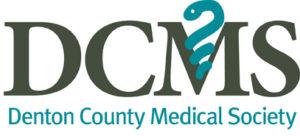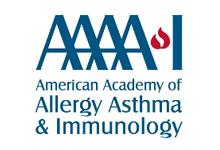Other Services
 In some situations it is medically necessary for patients that have a prior history of an allergic reaction to a medicine to take that medication daily for a medical condition due to lack of alternatives.
In some situations it is medically necessary for patients that have a prior history of an allergic reaction to a medicine to take that medication daily for a medical condition due to lack of alternatives.
Examples include aspirin for heart disease or penicillin and other antibiotics for certain infections. We desensitize the body to the drug needed by giving gradually increasing doses of the medication in question, starting with tiny doses and increasing slowly to the full dose, under close medical supervision in our office. The patient is then able to take the drug daily with minimal risk, remaining desensitized as long as the drug is taken on daily basis.
Read more about: Penicillin Allergy
 The field of biologic therapy has grown dramatically over the past two decades. Now there are biologic agents for allergic and immunologic diseases including, chronic urticaria (Xolair), asthma (Tezpire, Fasenra, Nucala, Xolair, Dupixent, Cinqair), eczema (Dupixent. Adbry), primary immune deficiencies (Hyqvia, Hizentra, Cuvitru, Xembify, Cutaquig, Gammagard, Gammagard S/D, Gamunex, Privigen, Octagam, Gammaked, Gammaplex, Carimune, Flebogamma, Bivigam) and Hereditary Angioedema (Orladeyo, Cinryze, Firazyr, Berinert, Haegarda, Kalbitor, Ruconest).
The field of biologic therapy has grown dramatically over the past two decades. Now there are biologic agents for allergic and immunologic diseases including, chronic urticaria (Xolair), asthma (Tezpire, Fasenra, Nucala, Xolair, Dupixent, Cinqair), eczema (Dupixent. Adbry), primary immune deficiencies (Hyqvia, Hizentra, Cuvitru, Xembify, Cutaquig, Gammagard, Gammagard S/D, Gamunex, Privigen, Octagam, Gammaked, Gammaplex, Carimune, Flebogamma, Bivigam) and Hereditary Angioedema (Orladeyo, Cinryze, Firazyr, Berinert, Haegarda, Kalbitor, Ruconest).
Our allergists are well trained in selecting the appropriate biologic therapy for your needs. Our staff is well-versed in working with pharmacies and insurance companies to obtain these medications in a timely fashion when indicated. Our nurses have many years of experience administering these types of medications.
Read more about: Biologic therapy for asthma
 Allergy blood tests detect and measure the amount of allergen-specific antibodies in the blood. After coming in contact with an allergen, the immune system makes antibodies against the allergen and these can be measured in the blood or by skin prick testing.
Allergy blood tests detect and measure the amount of allergen-specific antibodies in the blood. After coming in contact with an allergen, the immune system makes antibodies against the allergen and these can be measured in the blood or by skin prick testing.
Allergy skin testing is the gold standard, but in some cases blood testing may be ordered. Patients who cannot stop antihistamines, have severe eczema or another skin condition that would interfere with skin testing may instead be offered blood testing.
Other examples include if you cannot tolerate skin prick testing or have poorly controlled asthma.
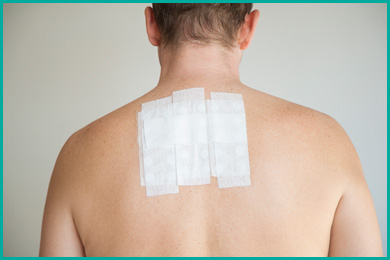 We offer patch testing for chemicals, metals, dental and orthopedic implants. Patch testing is a diagnostic tool used to identify common triggers of allergic contact dermatitis and atopic dermatitis.
We offer patch testing for chemicals, metals, dental and orthopedic implants. Patch testing is a diagnostic tool used to identify common triggers of allergic contact dermatitis and atopic dermatitis.
Patch testing helps identify triggers of a delayed-type allergic reaction--these triggers often cannot be identified by skin prick or blood testing. Up to 70 small patches of diluted chemicals are placed on the back for 48 hours and a local allergic reaction is produced that can identify the offending agent.
Patients can bring suspected products from home for testing as well. Common triggers of contact dermatitis include metals, cosmetics, perfumes, shampoos, hair dyes, skin care products, detergents, cleaning agents, adhesives, topical medicines, preservatives, additives and latex.
Our physicians will read the patch test at 48 and 72 hours and recommend appropriate avoidance measures and treatment.
Read more about: Contact Dermatitis
 Our on-site state-of-the-art Xoran MiniCAT CT scanner allows us to safely and painlessly image your sinuses and identify signs of sinusitis, nasal polyposis, and other structural abnormalities in less than 1 minute. There is no need for our patients to make an extra trip or be exposed to higher radiation levels typical of full-size CT scanners in hospitals and other imaging facilities.
Our on-site state-of-the-art Xoran MiniCAT CT scanner allows us to safely and painlessly image your sinuses and identify signs of sinusitis, nasal polyposis, and other structural abnormalities in less than 1 minute. There is no need for our patients to make an extra trip or be exposed to higher radiation levels typical of full-size CT scanners in hospitals and other imaging facilities.
All CT scans are overread by a Board-Certified Neuroradiologist. IAC (Intersocietal Accreditation Commission) requirements ensure that a imaging facility is providing high quality care and held to industry standards. Our center is a fully IAC accredited facility.
Our physicians are certified to perform and review the CT results with you immediately and direct appropriate treatment.
Read more about: Sinusitis
 We check pneumococcal (pneumonia) antibodies, prescribe pneumonia vaccines as needed and then check titers to ensure your immune system is working properly. We provide diagnostic vaccines such as the Hib and Tdap vaccines to aid in the evaluation of your immune system and to boost immunity to these agents. Inadequate response to these vaccines may indicate an abnormality in your immune system.
We check pneumococcal (pneumonia) antibodies, prescribe pneumonia vaccines as needed and then check titers to ensure your immune system is working properly. We provide diagnostic vaccines such as the Hib and Tdap vaccines to aid in the evaluation of your immune system and to boost immunity to these agents. Inadequate response to these vaccines may indicate an abnormality in your immune system.
Our physicians can determine whether you need these vaccines during your evaluation. We recommend the Flu shot for all our patients on an annual basis.
Read more about: Primary Immune Deficiencies and Immunoglobulin Replacement
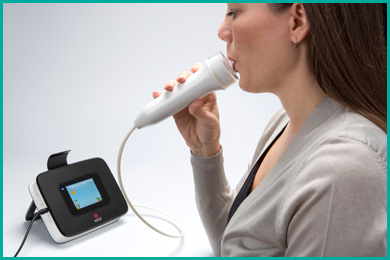 FeNO (Fractional expired Nitric Oxide) is a recognized biomarker/tool that helps clinicians evaluate allergic airway inflammation in patients with asthma. This diagnostic test helps predict the onset of asthma symptoms and helps prevent loss of asthma control as well as monitor allergic airway inflammation.
It is painless and easy to do, even for children.
FeNO (Fractional expired Nitric Oxide) is a recognized biomarker/tool that helps clinicians evaluate allergic airway inflammation in patients with asthma. This diagnostic test helps predict the onset of asthma symptoms and helps prevent loss of asthma control as well as monitor allergic airway inflammation.
It is painless and easy to do, even for children.
Our physicians will review your FeNO result with you and discuss its implications on your asthma treatment.
 Food patch testing is used to detect possible delayed-type food allergies. In delayed-type food allergies the food can be consumed with no obvious immediate symptoms, but over a period of days to weeks can cause inflammation and injury to the esophagus resulting in conditions including eosinophilic esophagitis and atopic dermatitis.
Food patch testing is used to detect possible delayed-type food allergies. In delayed-type food allergies the food can be consumed with no obvious immediate symptoms, but over a period of days to weeks can cause inflammation and injury to the esophagus resulting in conditions including eosinophilic esophagitis and atopic dermatitis.
Some patients with eosinophilic esophagitis and atopic dermatitis may benefit from food patch testing. Combining conventional allergy skin testing for foods with patch testing may better identify agents that are causing food allergy complications.
Read more about: Eosinophilic Esophagitis (EoE)
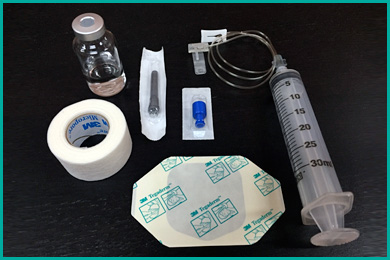 Patients with immune deficiencies suffer from repeated and severe infections because their immune system cannot make enough germ-fighting antibodies or the antibodies they do make do not function properly. Immunoglobulin G (IgG) therapy can reduce the frequency and severity of infections in these individuals and even save their lives.
Patients with immune deficiencies suffer from repeated and severe infections because their immune system cannot make enough germ-fighting antibodies or the antibodies they do make do not function properly. Immunoglobulin G (IgG) therapy can reduce the frequency and severity of infections in these individuals and even save their lives.
After proper training IgG replacement can be done at home as a subcutaneous infusion (under the skin) on a weekly, biweekly or monthly basis. For more severe cases IV infusion of IgG can be done at an infusion center or hospital.
Our physicians are experts in immune deficiency and can perform a thorough evaluation of your immune system and design an effective treatment plan for you.
Read more about: Primary Immune Deficiencies and Immunoglobulin Replacement
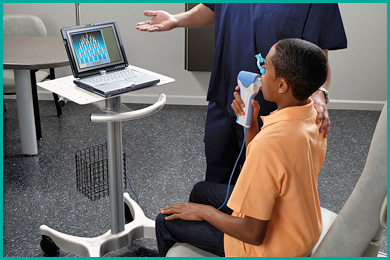 Lung function testing or pulmonary function testing measures how well the lungs work. This test is painless, easy to do, and measures how much air you can breathe in and how fast you can blow air out. Lung function tests are used to help diagnose conditions such as asthma and COPD (chronic obstructive pulmonary disease).
Lung function testing or pulmonary function testing measures how well the lungs work. This test is painless, easy to do, and measures how much air you can breathe in and how fast you can blow air out. Lung function tests are used to help diagnose conditions such as asthma and COPD (chronic obstructive pulmonary disease).
Our physicians can perform and interpret lung function tests for you if you have respiratory issues including asthma or COPD.
Read more about: Biologic therapy for asthma
 An oral food challenge is simply the best diagnostic test or gold standard for confirming or ruling out a food allergy. The concerning food is given in increasing doses, starting with tiny doses and building slowly to a full serving-size, under close medical supervision in our office.
An oral food challenge is simply the best diagnostic test or gold standard for confirming or ruling out a food allergy. The concerning food is given in increasing doses, starting with tiny doses and building slowly to a full serving-size, under close medical supervision in our office.
An oral food challenge can be done with almost any food including common allergens like peanuts, tree nuts, milk, eggs, wheat, soy, fish and shellfish.
Our physicians are experts in food allergy and can discuss potential food allergies with you and whether an oral food challenge is appropriate.
 Our physicians are among a select group of doctors in the United States with extensive experience in oral food desensitization. Our physicians have over 10 years of shared experience with oral immunotherapy. They have successfully desensitized patients of all ages to allergenic foods including peanuts, tree nuts, milk, eggs, soy, wheat and shrimp.
In our oral immunotherapy program, the concerning food item is gradually reintroduced, starting with tiny doses and increasing slowly to the full dose over the course of 4-6 months.
Our physicians are among a select group of doctors in the United States with extensive experience in oral food desensitization. Our physicians have over 10 years of shared experience with oral immunotherapy. They have successfully desensitized patients of all ages to allergenic foods including peanuts, tree nuts, milk, eggs, soy, wheat and shrimp.
In our oral immunotherapy program, the concerning food item is gradually reintroduced, starting with tiny doses and increasing slowly to the full dose over the course of 4-6 months.
This form of immunotherapy is conducted only under close medical supervision in our clinic with weekly office visits and oral challenges.
Our physicians can evaluate for food allergy and determine whether oral immunotherapy should be considered.
Read more about: Food Oral Immunotherapy (OIT)
 Allergy to penicillin is the most commonly reported drug allergy in the United States. PRE-PEN is the only FDA approved agent for skin testing in the diagnosis of penicillin allergy.
We can quickly and safely identify penicillin and other drug allergies by performing skin prick and intradermal skin testing followed by an oral drug challenge in our office under the close supervision of our experienced physicians.
Allergy to penicillin is the most commonly reported drug allergy in the United States. PRE-PEN is the only FDA approved agent for skin testing in the diagnosis of penicillin allergy.
We can quickly and safely identify penicillin and other drug allergies by performing skin prick and intradermal skin testing followed by an oral drug challenge in our office under the close supervision of our experienced physicians.
We also provide skin testing and graded oral or subcutaneous challenges in the office for other antibiotics, anesthetics and other medications.
Read more about: Penicillin Allergy
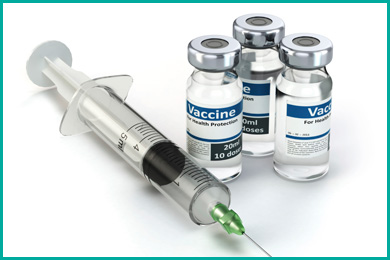 Vaccines save lives and most vaccines used now are extremely safe. Allergic reactions to vaccines do occur, and when they happen, episodes can be serious, even life-threatening. In such cases, our board-certified allergists can do skin prick testing and intradermal skin testing with a small dose of vaccine and other vaccine components to help identify the suspected allergen in the vaccine.
Vaccines save lives and most vaccines used now are extremely safe. Allergic reactions to vaccines do occur, and when they happen, episodes can be serious, even life-threatening. In such cases, our board-certified allergists can do skin prick testing and intradermal skin testing with a small dose of vaccine and other vaccine components to help identify the suspected allergen in the vaccine.
For the most part, even those with known allergies can be safely vaccinated using alternative forms of a vaccine that are free of the allergen. Even if allergen-free formulations are unavailable, many patients can still be vaccinated in our office and remain under physician supervision for several hours after vaccination.
 Venom testing and immunotherapy is indicated for patients that have experienced a severe allergic reaction or anaphylaxis following an insect sting. Common insects include fire ants, honeybees, wasps, yellow jackets and hornets.
Venom immunotherapy is extremely effective and can dramatically reduce the risk of future severe reactions in patients with a stinging insect allergy.
Venom testing and immunotherapy is indicated for patients that have experienced a severe allergic reaction or anaphylaxis following an insect sting. Common insects include fire ants, honeybees, wasps, yellow jackets and hornets.
Venom immunotherapy is extremely effective and can dramatically reduce the risk of future severe reactions in patients with a stinging insect allergy.
Our experienced physicians can determine whether venom testing is indicated and if venom immunotherapy should be initiated after a complete review of your history and test results.
Read more about:
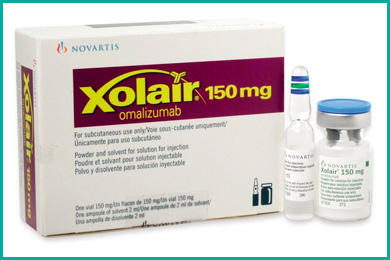 Xolair is an injectable treatment given in the office every 2 or 4 weeks for patients 6 years of age and older with moderate to severe asthma and 12 years of age and older with chronic idiopathic urticaria (hives). It works by blocking the immune system's allergic responses that can often lead to an asthma attack or hives in susceptible individuals.
Xolair is an injectable treatment given in the office every 2 or 4 weeks for patients 6 years of age and older with moderate to severe asthma and 12 years of age and older with chronic idiopathic urticaria (hives). It works by blocking the immune system's allergic responses that can often lead to an asthma attack or hives in susceptible individuals.
Xolair helps keeps asthma under better control and also effectively reduces the severity of hives in patients with chronic urticaria.
Our physicians can discuss with you whether treatment with Xolair is appropriate for you.
Read more about: Hives and Xolair







